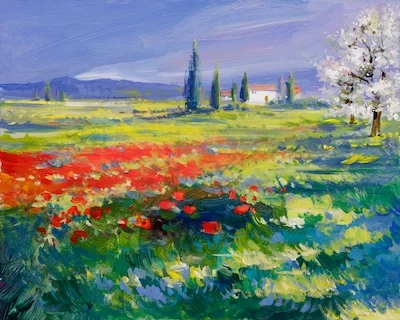JANE ASH POITRAS, Canada House Gallery, Banff November 12 - 22, 2011
1 of 3

"Northern Abstraction"
Jane Ash Poitras, "Northern Abstraction", mixed media on canvas, 20" x 30"
2 of 3

"Sleeping Giant"
Jane Ash Poitras, "Sleeping Giant", mixed media on canvas, 24" x 16"
3 of 3

"Entering the Ceremonial Sand Circle"
Jane Ash Poitras, "Entering the Ceremonial Sand Circle", mixed media on panel, 16" x 24"
JANE ASH POITRAS
Canada House Gallery, Banff
November 12 - 22, 2011
By Rob Alexander
In her recent book Cultural Memories and Imagined Futures: The Art of Jane Ash Poitras, author Pamela McCallum – through the words of aboriginal artist and curator Shirley Bear – invites viewers to feel the work of Jane Ash Poitras, who is of Cree/Dene descent, rather than analyze it through western eyes and ideals.
For, if the overly analytical westernized mind can be shut down, or at least stilled, the path to an emotional response towards this remarkable body of work lies open to her rich stories that speak of dignity and survival.
Poitras explores many layers of meanings and associations within the 12 mixed-media works in this exhibition. She takes complex themes about aboriginal people and tells ancient and intricate stories that serve to highlight the spirit and the survival of indigenous peoples throughout the world – including the Navajo of the American Southwest, the Maya of Mexico, the Inuit of the Arctic and the Métis of the prairies.
Poitras opens doors that at first glance may seem inappropriate. One such example is the mixed-media painting on panel, Entering the Ceremonial Sand Circle. As its primary element, this piece features a colour photograph of an interior view of a kiva (an enclosed room used by aboriginal people in the American Southwest for spiritual ceremonies) along with a shaman, a masked dancer and a circular sand painting.
The photograph is obviously an older one. It has the pale colours of a postcard from the 1950s and ‘60s, which means it was likely taken before the people of the Southwest, feeling the brunt of cultural appropriation, began to restrict recording of their sacred ceremonies.
Given that, is it appropriate for Poitras to share what is an inherently sacred and highly protected part of specific indigenous cultures with viewers – regardless if they are aboriginal people or not - who are not meant to see these ceremonies? But that question, comes from the overly analytical westernized mindset at work, which McCallum and Bear advise against.
Instead, stepping back with a deep breath and a long second thought, it becomes apparent Poitras has done something remarkable. Carefully combining this photograph with the colours of the Southwest desert – red, tan, beige, brown, white and green along with turquoise anthropomorphic figures common to the region – while restoring the portion of the sand circle cut from the photo by virtue of its rectangular shape, and etching the words “sacred ceremony” into a patch of yellow, blue and white paint that sits within the red circle, Poitras has successfully taken something from the public realm where it was likely just a curiosity and reminded viewers that what we are looking at is indeed sacred.
Entering the Ceremonial Sand Circle is not the only intriguing piece in this exhibition. The entire body of work in the exhibition is of equal strength. Individually, each one is quite unique in the subject matter, colours and the elements Poitras uses to tell her distinctive stories. Each also requires the same thoughtful yet open approach as Entering the Ceremonial Sand Circle, which is necessary as this work is not beautiful in the conventional sense and thus ensuring easy access. But once a connection is made, it is a body of work that can send shivers down the spine.
The overall effect is powerful in reminding us, that even if we seemingly have nothing in common with the individuals featured in Poitras’ paintings, that we do share two things: we are all people and we all hold something sacred.
Canada House Gallery
201 Bear Street (PO Box 1570), Banff, Alberta T1L 1B5
Toll-free 1-800-419-1298 or 403-762-3757
please enable javascript to view
Open daily
